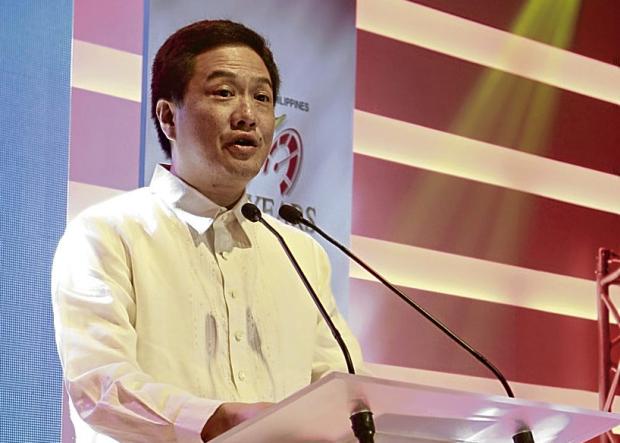Tañada: Managers may be wrong again about oil prices

Former House Deputy Speaker Erin Tañada (File photo from Philippine Daily Inquirer)
MANILA, Philippines — The country’s economic managers may be wrong again in their prediction of oil prices for 2019, former House Deputy Speaker Erin Tañada said on Wednesday.
Tañada emphasized that the same government officials who had mistakenly predicted monthly inflation rates said that oil prices for January 2019 would not be as high as it was in 2018.
“Kung sinasabi po nila na ang projection ay hindi tataas ang presyo, eh nagkamali na sila noon. Pwede silang magkamali ulit ngayon,” he said during a press briefing in Quezon City.
[When they said their projection was that the price wouldn’t go up, they were wrong. They can be wrong again now.]
“Sabi nila hindi tataas ang inflation. Ngayon sinisingil sila sa sinabi nila na hindi pagtaas ng inflation. Ano’ng sinasabi nila? Wow, Mali. Pwedeng ma-wow, mali na naman sila rito,” he added.
[They said inflation would’t rise. Now they’re being called to task for saying that inflation won’t rise. What are they saying? Wow, it’s wrong. They could be wrong again this time.]
On Tuesday, President Rodrigo Duterte approved during a Cabinet meeting the second round of excise taxes for oil products, as mandated by the Tax Reform for Acceleration and Inflation (TRAIN) Act.
Budget Secretary Benjamin Diokno said this move was based on predictions that world crude prices would further go down in 2019.
“At its peak, diesel price was P49.80 per liter,” Diokno said. “It will be P37.76 in January [20]19, inclusive of the P2 peso excise tax. For gasoline [95 Octane] it was P60.90 at its peak, it will be P50.82 in Jan ’19 inclusive of P2 additional excise tax,” Diokno said.
Inflation for August reached 6.4 percent — the highest in nine years. That was surpassed by a staggering 6.7 percent in September. Both figures are way above government estimates.
Oil prices have gone down steadily since peaking at around P60 for gasoline and P50 for diesel, prompting the Land Transportation Franchising and Regulatory Board (LTFRB) to bring back the minimum fare for jeepneys in Metro Manila to P9.
Despite the recent strings of oil price rollbacks, Tañada said that this was not enough reason to continue with the implementation of excise taxes.
“Unang-una, hindi pa naman bumababa ang presyo ng bilihin,” he said. “Ang importante dito, hintayin mo muna bumaba ‘yong presyo ng mga bilihin natin para hindi mahirapan ang ating mga mamamayan.”
[First of all, the prices of good have not gone down. What’s important here is to wait for the prices of good to go down so that our countrymen won’t suffer.]
“Ayokong gamitin na porket bumaba lang ang presyo ng langis ay pwede nang itaas ulit ang excise taxes,” he added. “Importante ang mga projection na ginagawa nila eh pag-aralan nang mas mabuti at mas mahaba dahil alam naman po natin ang problema no’ng 2018.”
[I don’t want to use the justification that just because the price of oil has gone down then we can again raise excise taxes. It’s important for them to study the projections they’re making more closely and longer, because we all know what problem we had in 2018.]
The senatorial candidate also asked the government to provide a safety net for the poor and widen the coverage of the cash assistance, especially since minimum wage earners did not benefit from the income tax exemption — because they were exempted from it to begin with.
“I-expand po natin itong mga tumatanggap ng conditional cash transfers dahil alam naman po natin na hindi naman lahat ng mga tao ay nagbenepisyo sa pagbaba ng income tax,” Tañada said.
[Let’s expand the coverage of the conditional cash transfers because, as we all know, not all people have benefited from the lower income tax.]
“Marami po ang hindi, lalong-lalo na sa probinsya, sa Quezon, kung saan umaasa po sa niyog. Ang presyo po ng niyog ngayon eh talagang bagsak. Uumaabot po ng P4 kada kilo. Ito po ’yong nararanasan sa kanayunan ngayon — at umaaray sa usapin ng excise taxes,” he added.
[So many did not benefit from it, especially in the provinces, like Quezon, where they’re all relying on coconuts. The price of coconuts now is really down. It has reached P4 per kilogram. This is what they’re experiencing in rural areas now — they’re hurt by excise taxes.] /atm